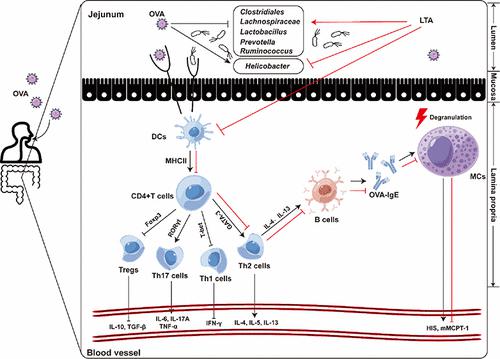当前位置:
X-MOL 学术
›
J. Agric. Food Chem.
›
论文详情
Our official English website, www.x-mol.net, welcomes your
feedback! (Note: you will need to create a separate account there.)
L-Theanine Modulates Intestine-Specific Immunity by Regulating the Differentiation of CD4+ T Cells in Ovalbumin-Sensitized Mice
Journal of Agricultural and Food Chemistry ( IF 5.7 ) Pub Date : 2022-11-17 , DOI: 10.1021/acs.jafc.2c06171 Qing-Yun Qu 1, 2, 3 , Xian-Ying Song 1, 2, 3 , Ling Lin 1, 2, 3 , Zhi-Hua Gong 1, 2, 3 , Wei Xu 1, 2, 3 , Wen-Jun Xiao 1, 2, 3
Journal of Agricultural and Food Chemistry ( IF 5.7 ) Pub Date : 2022-11-17 , DOI: 10.1021/acs.jafc.2c06171 Qing-Yun Qu 1, 2, 3 , Xian-Ying Song 1, 2, 3 , Ling Lin 1, 2, 3 , Zhi-Hua Gong 1, 2, 3 , Wei Xu 1, 2, 3 , Wen-Jun Xiao 1, 2, 3
Affiliation

|
Ovalbumin (OVA), a common food protein, can cause deadly allergies with intestine-specific immune reactions. L-Theanine (LTA) shows great potential for regulating intestinal immunity. To investigate the regulatory effect of LTA intervention on intestine-specific immunity, a 41 day experiment was performed on BALB/c OVA-sensitized mice. The results show that injecting female mice intraperitoneally with 50 μg of OVA and administering 30 mg of OVA 4 times can successfully establish an OVA-sensitized mouse model. LTA intervention significantly increased weight gain and thymus index (p < 0.05), decreased allergy and diarrhea scores (p < 0.05), and improved jejunum structure. Meanwhile, the histological score and degranulation of mast cells decreased. LTA intervention increased Clostridiales, Lachnospiraceae, Lactobacillus, Prevotella, and Ruminococcus abundance while decreasing Helicobacter abundance. Flow cytometry and Western blotting results indicated that 200 and 400 mg/kg of LTA upregulated the expression of T-bet and Foxp3 proteins (p < 0.05), thus promoting the differentiation of jejunum CD4+ T cells to Th1 and Tregs and increasing the cytokines IFN-γ, IL-10, and TGF-β (p < 0.05). We found that 200 and 400 mg/kg of LTA downregulated the expression of RORγt and GATA3, thus inhibiting the differentiation of Th2 and Th17 cells and decreasing cytokines IL-4, IL-5, IL-13 TNF-α, IL-6, and IL-17A (p < 0.05). LTA inhibited the degranulation of mast cells and significantly decreased the serum levels of OVA-IgE, HIS, and mouse MCPT-1 (p < 0.05). Therefore, LTA intervention alleviated OVA allergy by improving intestine-specific immunity.
中文翻译:

L-茶氨酸通过调节卵清蛋白致敏小鼠 CD4+ T 细胞的分化来调节肠道特异性免疫
卵清蛋白 (OVA) 是一种常见的食物蛋白质,可通过肠道特异性免疫反应引起致命的过敏反应。L-茶氨酸 (LTA) 显示出调节肠道免疫的巨大潜力。为了研究 LTA 干预对肠道特异性免疫的调节作用,对 BALB/c OVA 致敏小鼠进行了为期 41 天的实验。结果表明,雌性小鼠腹腔注射50 μg OVA,分4次给药30 mg OVA,可成功建立OVA致敏小鼠模型。LTA 干预显着增加了体重增加和胸腺指数 ( p < 0.05),降低了过敏和腹泻评分 ( p < 0.05),并改善了空肠结构。同时,肥大细胞的组织学评分和脱颗粒减少。LTA干预增加梭菌目、毛螺菌科、乳杆菌、普雷沃氏菌和瘤胃球菌的丰度,同时降低螺杆菌的丰度。流式细胞术和Western blotting结果表明,200和400 mg/kg的LTA上调T-bet和Foxp3蛋白的表达(p < 0.05),从而促进空肠CD4+ T细胞向Th1和Tregs的分化,增加细胞因子IFN -γ、IL-10 和 TGF-β ( p< 0.05)。我们发现 200 和 400 mg/kg 的 LTA 下调 RORγt 和 GATA3 的表达,从而抑制 Th2 和 Th17 细胞的分化,降低细胞因子 IL-4、IL-5、IL-13、TNF-α、IL-6、和 IL-17A ( p < 0.05)。LTA 抑制肥大细胞脱颗粒并显着降低 OVA-IgE、HIS 和小鼠 MCPT-1 的血清水平 ( p < 0.05)。因此,LTA 干预通过提高肠道特异性免疫来减轻 OVA 过敏。
更新日期:2022-11-17
中文翻译:

L-茶氨酸通过调节卵清蛋白致敏小鼠 CD4+ T 细胞的分化来调节肠道特异性免疫
卵清蛋白 (OVA) 是一种常见的食物蛋白质,可通过肠道特异性免疫反应引起致命的过敏反应。L-茶氨酸 (LTA) 显示出调节肠道免疫的巨大潜力。为了研究 LTA 干预对肠道特异性免疫的调节作用,对 BALB/c OVA 致敏小鼠进行了为期 41 天的实验。结果表明,雌性小鼠腹腔注射50 μg OVA,分4次给药30 mg OVA,可成功建立OVA致敏小鼠模型。LTA 干预显着增加了体重增加和胸腺指数 ( p < 0.05),降低了过敏和腹泻评分 ( p < 0.05),并改善了空肠结构。同时,肥大细胞的组织学评分和脱颗粒减少。LTA干预增加梭菌目、毛螺菌科、乳杆菌、普雷沃氏菌和瘤胃球菌的丰度,同时降低螺杆菌的丰度。流式细胞术和Western blotting结果表明,200和400 mg/kg的LTA上调T-bet和Foxp3蛋白的表达(p < 0.05),从而促进空肠CD4+ T细胞向Th1和Tregs的分化,增加细胞因子IFN -γ、IL-10 和 TGF-β ( p< 0.05)。我们发现 200 和 400 mg/kg 的 LTA 下调 RORγt 和 GATA3 的表达,从而抑制 Th2 和 Th17 细胞的分化,降低细胞因子 IL-4、IL-5、IL-13、TNF-α、IL-6、和 IL-17A ( p < 0.05)。LTA 抑制肥大细胞脱颗粒并显着降低 OVA-IgE、HIS 和小鼠 MCPT-1 的血清水平 ( p < 0.05)。因此,LTA 干预通过提高肠道特异性免疫来减轻 OVA 过敏。











































 京公网安备 11010802027423号
京公网安备 11010802027423号